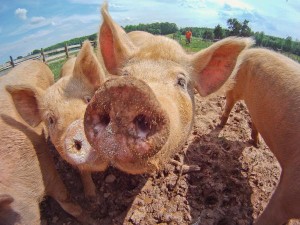It’s not just for cats anymore.
In 2012, Hip-music-listening, and general all around good guy Mike Batz (and co-authors) identified Toxoplasma gondii and pork as the second most burdensome food-pathogen combination, resulting in an estimated 35,000 illnesses annually in the U.S.
At least 20 Brazilian cases of toxoplasmosis have been confirmed with another 70 showing symptoms according to Folha Geral (some things may be lost in translation).
Five months after identifying an outbreak of toxoplasmosis in the premises of the Agronomic Institute of Paraná (Iapar), in the south of Londrina, the Department of Epidemiological Surveillance of the Municipal Health Department yesterday confirmed another outbreak, this time in the unit of the Brazilian Agricultural Research Corporation (Embrapa), located in the district of Warta, in the north.
According to the manager of Epidemiological Surveillance Londrina, Rosangela Libaroni, 73 people showed symptoms of the disease transmitted by the feces of cats between the end of last year and the end from January. The tests confirmed 20 cases of acute toxoplasmosis and dismissed another ten. The rest of the cases still under investigation follows awaiting official reports. Three patients presented symptoms but were not contaminated.
The task force set up to try to identify the source of contamination has a partnership with the State University of Londrina (UEL). The head of the Department of Preventive Veterinary Medicine UEL, Italmar Navarro, said the research follows in the analysis phase, but said that the contamination through the water was discarded. He also recalled that there was no conclusion about the focus of contamination that caused the outbreak in Iapar late last year after a series of laboratory tests.
Yesterday afternoon, the troughs of Embrapa who were sealed were reactivated. Already the cafeteria remains interdicted. Rosangela reported that all the people who have been infected will be heard to see if they were eating at the local cafeteria. “If it is not the water, suspicion falls on the food. We have to know the origin of this food, because of the outbreak of risk elsewhere in the city,” Rosangela warned.
